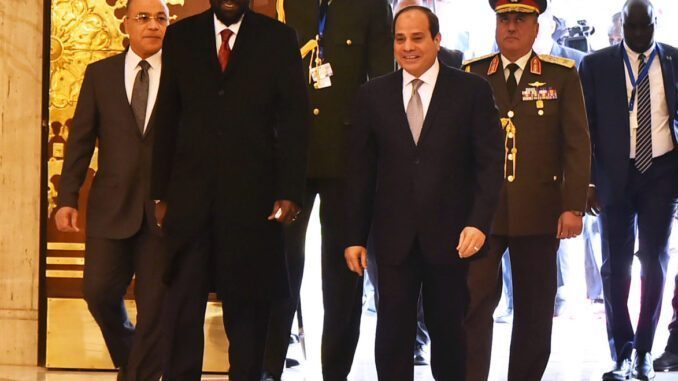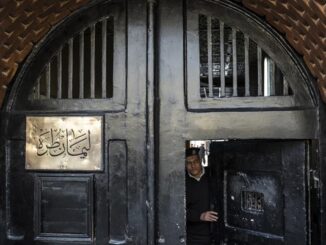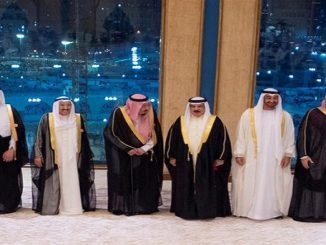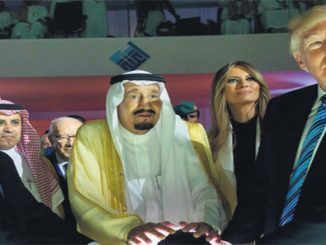
The Emirati English-language newspaper, The National, has promoted a scheme related to the construction of a large dam in South Sudan on the Nile River, despite the Emirati-financed Ethiopian Renaissance Dam crisis.
The newspaper conducted an interview with a prominent official in South Sudan, during which he announced that his country plans to realize the dream of building a large dam on the Nile River, in order to provide electricity and prevent devastating floods.
Deng Dao Deng, Deputy Minister of Foreign Affairs of South Sudan, said in an interview with the Emirati newspaper, that his country has the money and motivation to start industrialization after the end of the civil war.
In an interview held in the capital, Juba, before the tenth anniversary of the founding of the state of South Sudan, the newest in the world, the minister added, “Our country suffers from floods, lack of electricity, water scarcity and poor infrastructure, and the project is part of the government’s plan, and it will be financed from oil revenues.”
He added: “Look at our country today, most of South Sudan is flooded as we speak, and the Upper Nile State is under water, and we as a country have not had the opportunity to think and plan, and we must look at the needs of the population, and the growing industries.”
New dam details
On the details of the dam, Deng said that the Ministry of Irrigation issued instructions to start conducting preliminary studies to help prepare construction plans, including the extent of the dam’s height, the size of the reservoir behind the dam’s body and the number of turbines that can operate, according to what Russia Today reported.
He continued, “We will take into consideration, when building the dam, the environmental impact, the hydrological factor (of groundwater), its sustainability, and the expected damages and problems.”
The minister said South Sudan plans to get foreign investment to help build the dam, mainly from China.
South Sudan is located to the west of Ethiopia and to the north of Sudan and Egypt. The White Nile flows through the country and is one of the main tributaries that feed the Nile River, which meets and mixes near Khartoum with the Blue Nile that flows from the Ethiopian highlands.
The monsoon rains hit the 10 states of South Sudan for at least 7 months of the year, sending massive cascades of water into the White Nile, but also causing flooding.
On the possibility of the dam causing a clash with the downstream countries of Egypt and Sudan, as well as the Renaissance Dam in Ethiopia, he said that the use of water resources is our sovereign right, and the Nile water should not be a curse, but rather a peaceful commodity that God gave to the region.
He continued, “Our view, as a government, is that we encourage Egypt, Sudan and Ethiopia to discuss and conduct a better dialogue to reach acceptable solutions, and to accommodate Sudan’s concerns and Egypt’s.”
He pointed out that “any water source can cause a problem for most countries, but we do not encourage a military solution to the crisis because this should not be the solution.”
The minister said South Sudan plans to get foreign investment to help build the dam, mainly from China.
Earlier, the recent verbal altercation between two members of the Egyptian parliament regarding the UAE’s financing of the Ethiopian Renaissance Dam represented the first semi-official sign of Cairo’s anger over Abu Dhabi’s role in the dam crisis.
The two Egyptian representatives, Mostafa Bakri and Diaa El-Din Daoud, got into an argument over the latter’s accusation of “one of the Arab countries in financing the Renaissance Dam,” without naming the state.
According to an identical text mentioned by Egyptian media, including the state-owned newspaper, Akhbar Al-Youm, “During the parliament session, Bakri said: “Daoud belongs to the Nasserite nationalism (relative to former Egyptian President Gamal Abdel Nasser), which called for respect for Arabism, but he gave signals that I did not wish that He refers to it that an Arab country is involved in financing the Renaissance Dam.”
He added, “The aforementioned country sent an envoy a few days ago to Sudan and Ethiopia, and he submitted to the political leadership a comprehensive report on the situation and stands with us in the same trench,” which was considered a clear indication to the Emirates.
According to the same sources, “Daoud tried to interrupt him, and they waved hands at each other, but the head of the council, Hanafi al-Jabali, intervened to break up the argument,” saying: “The matter is over and the words were deleted from the record.”
In light of the current structure of the regime in Egypt, it is difficult to imagine that this argument is spontaneous and that Representative Diaa El-Din Daoud, who is charged with the opposition, made this accusation in two very sensitive issues, namely the file of the Renaissance Dam, and the relationship with the UAE on his own.
Also, Bakri’s response, known to be close to the security services, appears to be a disavowal by the state of this accusation, which was issued by a deputy described as an opponent, but usually does not take a sharp opposition or a clear disagreement with the state’s policy.
The most important thing is that Egyptian newspapers, including official newspapers, publish this text. It cannot be spontaneous or press discretion, in light of the strict control over the media in Egypt, which prevents the publication of news that is much less sensitive than this news.



